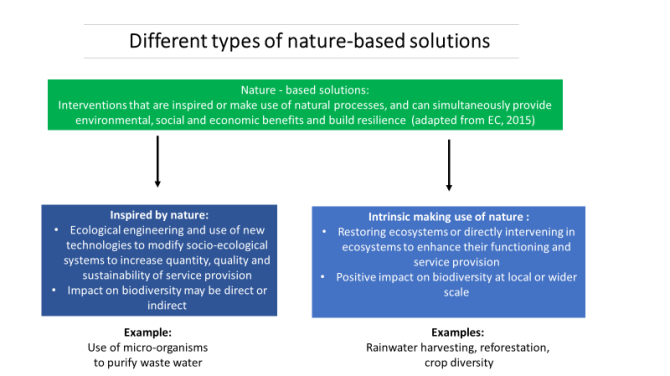
Project Description of Nature-based Solutions for Climate Resilient and Circular Food Systems
This project aims to improve our understanding about nature-based solutions (NBS) in the context of food systems at risks due to climate change. The project will generate knowledge about pathways and interventions that are inspired by or make use of natural processes and aim to help food systems to become more climate resilient and circular in the long term while at the same time food safety is ensured. Considering the increasing claims for land that climate action requires (as well as the energy and protein transitions), the project will specifically examine nature-based solutions supporting the multifunctional use of land and reuse of biomass and water.
Objectives and research questions
Objectives
- Finalise the workplan for 2020.
- Improve understanding of underlying mechanisms of NBS and the ecosystem services they could deliver.
- Improve understanding of opportunities and challenges for NBS in supporting food security and circularity under climate change conditions by implementing two overarching case studies in The Netherlands, Africa and Asia.
- Draft a position paper describing the position of Wageningen University and Research on NBS in the context of food systems under climate change.
- Further develop and experiment with the participatory GIS based decision support tool. This tool will facilitate decision makers in scanning promising NBS and their locations at farm and landscape /watershed level now and for future scenarios.
- Further develop tailored narratives for NBS to strengthen climate resilience of food systems.
- Further develop the website ‘nature-based adaptation solutions in food systems’.
- Draft a scientific paper ‘nature-based solutions supporting food systems’ challenges’.
- Develop a detailed workplan for 2021.
Research questions
- How can NBS be defined?
- What do NBS claim to offer food system’s in their strive for food security and circularity under climate change conditions?
- What knowledge does already exist and what are knowledge gaps about mechanisms underpinning the functioning of nature-based solutions?
- What are drivers and hindering factors determining successful implementation of NBS in different socio-ecological and climatic contexts?
- What are the interactions between NBS and circularity across different scales and what are potential synergies and limitations in linking both concepts in the context of food systems?
- What are essential processes, data, information and tools for supporting multi- stakeholders in a food system to jointly explore potentials for NBS?
- What are useful methods and approaches to explore viable business models that could support implementation and scaling of the NBS?
Implementation
The project team distinguished two types of nature-based solutions i.e. those 1) inspired by nature and 2) intrinsic making use of or based on natural processes. Both types are relevant for this project because they are assumed to 1) contribute to food security in the context of climate change, 2) address climate related risks affecting food systems, 3) maintain and/or increase biodiversity and 4) support circularity in food systems. In 2020, this project will build upon the results of 2019, by creating a knowledge base for inspired and intrinsic NBS in the context of food systems in different socio-ecological and climatic conditions. The transdisciplinary research includes literature research and case study research and facilitates a dialogue within Wageningen University & Research.

Funding: the authors would like to acknowledge funding from the Wageningen University & Research "Food Security and Valuing Water programme" that is supported by the Dutch Ministry of Agriculture, Nature and Food Security.